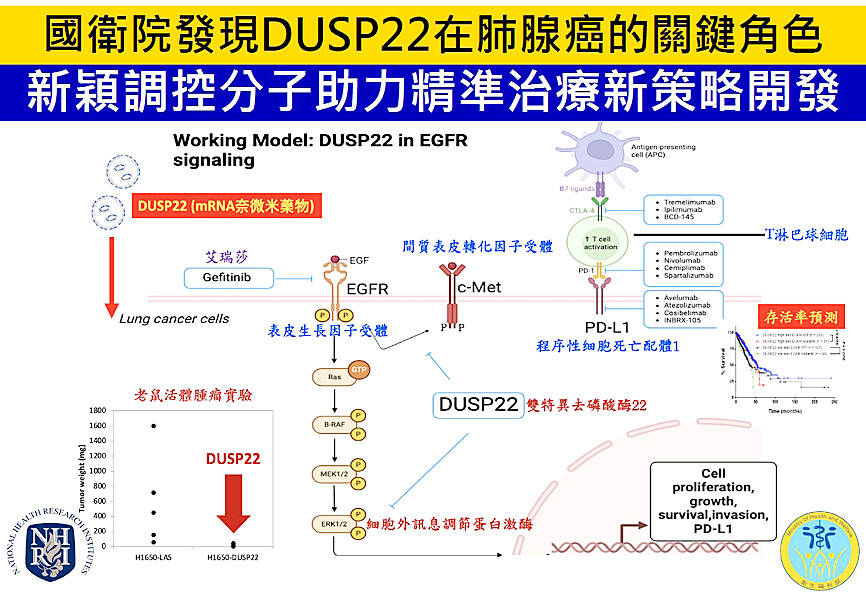Taiwanese researchers have linked higher survival rates and decreased tumor spread in patients with adenocarcinoma of the lung to a gene, the National Health Research Institute said on Friday.
This research clarifies the mechanism of lung adenocarcinoma’s spread and has implications for cancer treatment, it said.
Adenocarcinoma of the lung accounted for 40 percent to 50 percent of all cases of lung cancer, the most prevalent cause of death in Taiwan, according to government data.

Photo courtesy of the National Health Research Institute
A study led by institute associate investigator Lin Wen-jye (林文傑) discovered via bioinformatics that the expression of the DUSP22 gene is linked to better outcomes for lung adenocarcinoma patients, the institute said.
The research team drew on US-based studies on the genetic lineage of cancer cells, it said.
The DUSP22 gene encodes dual specificity protein phosphatase 22, an enzyme that plays a key role in regulating epidermal growth factor receptors (EGFR) and the downstream extracellular signal-regulated kinases pathways in lung adenocarcinoma cells, it said.
This means cancer cells lacking the gene’s expression are susceptible to tyrosine kinase inhibitors affecting the EGFR, pointing to new possibilities for targeted therapy, it said.
DUSP22 expression could potentially be applied to predict tumor severity and its responsiveness to treatments, allowing doctors to strategize treatment plans more effectively, it said.
The research could also open new doors to future studies into the role the DUSP22 gene plays in cancer cell drug resistance, microenvironment and metastasis, the institute said.
The research team’s findings deepened scientific understanding of mechanisms enabling lung adenocarcinoma progression and opened new doors to potential therapeutic approaches, it said.
The study was published in Cell Death Discovery in July last year, the institute said.

DEFENSE: The National Security Bureau promised to expand communication and intelligence cooperation with global partners and enhance its strategic analytical skills China has not only increased military exercises and “gray zone” tactics against Taiwan this year, but also continues to recruit military personnel for espionage, the National Security Bureau (NSB) said yesterday in a report to the Legislative Yuan. The bureau submitted the report ahead of NSB Director-General Tsai Ming-yen’s (蔡明彥) appearance before the Foreign and National Defense Committee today. Last year, the Chinese People’s Liberation Army (PLA) conducted “Joint Sword-2024A and B” military exercises targeting Taiwan and carried out 40 combat readiness patrols, the bureau said. In addition, Chinese military aircraft entered Taiwan’s airspace 3,070 times last year, up about

A magnitude 4.3 earthquake struck eastern Taiwan's Hualien County at 8:31am today, according to the Central Weather Administration (CWA). The epicenter of the temblor was located in Hualien County, about 70.3 kilometers south southwest of Hualien County Hall, at a depth of 23.2km, according to the administration. There were no immediate reports of damage resulting from the quake. The earthquake's intensity, which gauges the actual effect of a temblor, was highest in Taitung County, where it measured 3 on Taiwan's 7-tier intensity scale. The quake also measured an intensity of 2 in Hualien and Nantou counties, the CWA said.

The Overseas Community Affairs Council (OCAC) yesterday announced a fundraising campaign to support survivors of the magnitude 7.7 earthquake that struck Myanmar on March 28, with two prayer events scheduled in Taipei and Taichung later this week. “While initial rescue operations have concluded [in Myanmar], many survivors are now facing increasingly difficult living conditions,” OCAC Minister Hsu Chia-ching (徐佳青) told a news conference in Taipei. The fundraising campaign, which runs through May 31, is focused on supporting the reconstruction of damaged overseas compatriot schools, assisting students from Myanmar in Taiwan, and providing essential items, such as drinking water, food and medical supplies,

New Party Deputy Secretary-General You Chih-pin (游智彬) this morning went to the National Immigration Agency (NIA) to “turn himself in” after being notified that he had failed to provide proof of having renounced his Chinese household registration. He was one of more than 10,000 naturalized Taiwanese citizens from China who were informed by the NIA that their Taiwanese citizenship might be revoked if they fail to provide the proof in three months, people familiar with the matter said. You said he has proof that he had renounced his Chinese household registration and demanded the NIA provide proof that he still had Chinese